#William Stieg
Explore tagged Tumblr posts
Text
Books based on your MBTI
INFJ (The Advocate):
"The Secret History" by Donna Tartt
"The Night Circus" by Erin Morgenstern
INTJ (The Architect):
"Dune" by Frank Herbert
"Neuromancer" by William Gibson
INFP (The Mediator):
"The Little Prince" by Antoine de Saint-Exupéry
"The Ocean at the End of the Lane" by Neil Gaiman
INTP (The Logician):
"The Hitchhiker's Guide to the Galaxy" by Douglas Adams
"The Name of the Wind" by Patrick Rothfuss
ENFJ (The Protagonist):
"To Kill a Mockingbird" by Harper Lee
"The Help" by Kathryn Stockett
ENTJ (The Commander):
"Gone Girl" by Gillian Flynn
"American Psycho" by Bret Easton Ellis
ENFP (The Campaigner):
"Where the Crawdads Sing" by Delia Owens
"The Secret Life of Bees" by Sue Monk Kidd
ENTP (The Debater):
"Fight Club" by Chuck Palahniuk
"The Catcher in the Rye" by J.D. Salinger
ISTJ (The Inspector):
"The Girl with the Dragon Tattoo" by Stieg Larsson
"The Da Vinci Code" by Dan Brown
ESTJ (The Supervisor):
"The Firm" by John Grisham
"The Pelican Brief" by John Grisham
ISFJ (The Protector):
"Pride and Prejudice" by Jane Austen
"Little Women" by Louisa May Alcott
ESFJ (The Provider):
"The Help" by Kathryn Stockett
"Fried Green Tomatoes at the Whistle Stop Cafe" by Fannie Flagg
ISTP (The Craftsman):
"The Road" by Cormac McCarthy
"No Country for Old Men" by Cormac McCarthy
ESTP (The Dynamo):
"American Gods" by Neil Gaiman
"The Girl on the Train" by Paula Hawkins
ISFP (The Composer):
"The Alchemist" by Paulo Coelho
"The Secret Garden" by Frances Hodgson Burnett
ESFP (The Performer):
"Eat, Pray, Love" by Elizabeth Gilbert
"Brida" by Paulo Coelho

#creative writing#writing#writers block#writing advice#writblr#writers on tumblr#writeblr#writing community#writing tips#words#x reader#books and reading#currently reading#bookworm#booklr#reading#books#classics#mbti types#mbti#mbti personality types#mbti personalities#entj#enfp#infj
177 notes
·
View notes
Text
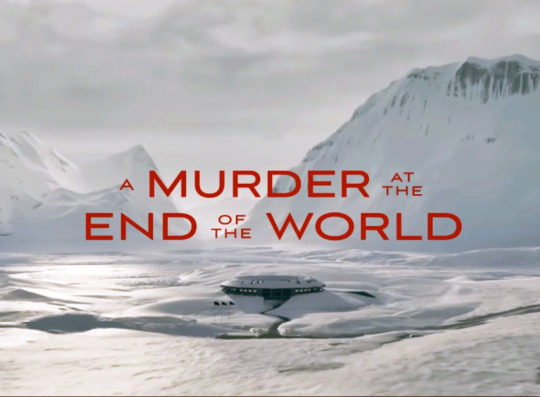
Brit Marling and Zal Batmanglij's The OA stands as one of the more fascinating artifacts from the anything-goes era of Netflix-- an unfettered, deeply personal vision that somehow exists in superposition between love it or hate it. Their new Hulu series, A Murder at the End of the World, isn't as bugnuts, but after two episodes I'm totally on board. The show is a cyberpunk-tinged whodunnit that feels equally inspired by Agatha Christie, William Gibson, Stieg Larsson, and Alex Garland. Marling has half-jokingly mentioned Carmen Sandiego as an unconscious influence, but the vibe is far closer to the games of Hideo Kojima. Most of the action unfolds in a high-tech Icelandic compound straight out of Death Stranding, haunted by mysterious masked figures and AI holograms. As with Kojima, subtlety is in short supply-- the needle drops are defiantly dorky, the characters broadly archetypal (a Banksyesque artist critical of Silicon Valley goes by the moniker FANGS), and the ideas and emotions unabashedly big. If you like your gothic techno-dystopias with an undercurrent of aching sincerity, new episodes out Tuesdays.
38 notes
·
View notes
Text
Südengland 2023 - Tag 26
Ladies and Gentlemen!
Nachdem man uns relativ kurzfristig die Unterkunft in Dover aufgekündigt hatte, angeblich wegen “unforeseen circumstances”, konnten wir uns - nach einigem hin & her - bei booking com eine neue Unterkunft aus deren Portfolio aussuchen.

Da die ursprüngliche Unterkunft, wie schon von uns vermutet, die Ferienwohnung überbucht hatte, bekommen sie jetzt von booking com die Mehrkosten aufs Auge gedrückt. Dazu wurden die Vermieter auf dieser Buchungsplattform gesperrt, da das nicht das erste Mal war.

Jedenfalls sitzen wir jetzt 20 Minuten von Dover entfernt, im beschaulichen Küstenstädtchen Deal - ein kleines, aber verstecktes Juwel.

Zum Abschluß unserer Reise widmen wir uns einem der größten Skandale, der vor rund 100 Jahren das südliche England buchstäblich in Atem hielt. Worum ging es dabei? Natürlich um Liebe, Leidenschaft, Ehebruch and everything in between. How shocking!

Schauplatz des ganzen Liebeswirrwarrs war das prachtvolle Walmer Castle, das nur gerade einmal 1.500 Meter von unserer Unterkunft entfernt liegt. Da können wir das Auto prima stehen lassen und machen uns zu Fuß auf den Weg.

Ursprünglich war das Walmer Castle, das knapp 12 km östlich von Dover liegt, eine Tudor-Festung. Im Jahr 1540 zur Zeit der Herrschaft von Heinrich VIII erbaut, diente die Festung zum Schutz vor Angriffen der Spanier und Franzosen.

Ganz typisch dafür sind die runden Außenmauern, geformt wie eine Blüte in mehreren Kreisen. Deshalb spricht man auch hier von der Tudor-Rose.

Sinn und Zweck war, dass der Kanonenbeschuss feindlicher Schiffe nicht so viel Schaden anrichten konnte, weil durch die Abrundung nur ein kleiner Teil des Mauerwerks zerstört wurde.

Von hier aus hat man einen strategisch guten Überblick über die See, da die Anlage direkt am Strand liegt. Seit 1708 ist Walmer Castle der Sitz des Lord Warden of the Cinque Ports.

Dies sind die Inhaber des ältesten militärischen Amtes in England. Sie repräsentiert den britischen Monarchen in den Cinque Ports, einem Bund von ursprünglich fünf, heute 14 Hafenstädten in Kent und Sussex. In früheren Zeiten ein wichtiger Posten, ist er längst ein (einträglicher) Ehrenposten für verdiente britische Persönlichkeiten.

Erwähnenswert finde ich folgende Amtsinhaber:
Arthur Wellesley, 1. Duke of Wellington, der 1852 im Walmer Castle verstarb. Der Sessel, in dem er verstarb, ist noch vorhanden und zu besichtigen.
Auch ein Paar Stiefel des Dukes sind zu sehen. Deren englische Bezeichnung „Wellington Boots“ (kurz Wellies) für Gummistiefel geht auf diesen zurück.
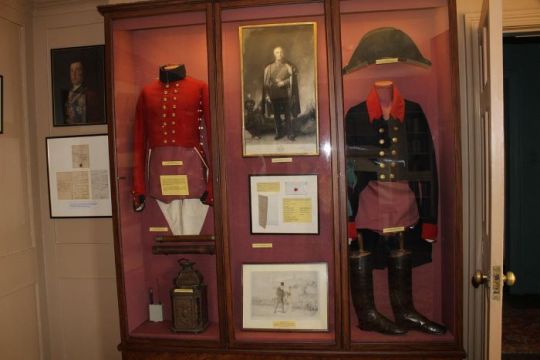
Sir Winston Churchill, wichtig(st)er britischer Staatsmann des 20. Jahrhunderts, hatte das Amt von 1941 bis zu seinem Tod 1965 inne.
Elisabeth, die Königinmutter (als „Queen Mum“ bekannt, der offizielle Titel lautet „Queen Elisabeth The Queen Mother“; sie war schließlich selbst einmal englische Königin). Sie hatte das Amt von 1978 bis zu ihrem Tod 2002 für 23 Jahre inne.

Und der schöne William Lygon, 7. Earl Beauchamp. Seit der Serie Outlander wissen wir, dass man Beauchamp nicht französisch ausspricht, sondern durch Anglisierung: Bietsch-häm.
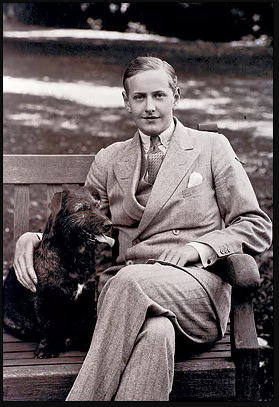
William Lygon wurde 1872 geboren und war schon in jungen Jahren eine bekannte Persönlichkeit des öffentlichen Lebens. Er trat 1891 die Nachfolge seines Vaters als Earl Beauchamp an. Als hochrangige Persönlichkeit der Liberalen Partei stieg er bis zum Senior auf und 1910 wurde er Kabinettsminister.
1902 heiratete er Lettice Grosvenor, die Schwester von Hugh Grosvenor, 2. Duke of Westminster. Sie hatten insgesamt 7 Kinder, drei Söhne und vier Töchter. Familienfotos zeigen Beauchamp, Lettice und ihre sieben Kinder, wie sie ihre Umgebung und die Gesellschaft des anderen im Walmer genießen.
Anscheinend hatte der Duke of Westminster seinen Schwager William nie gemocht, da er eifersüchtig auf das öffentliche Amt seines Schwagers und sein offensichtliches häusliches Glück war.
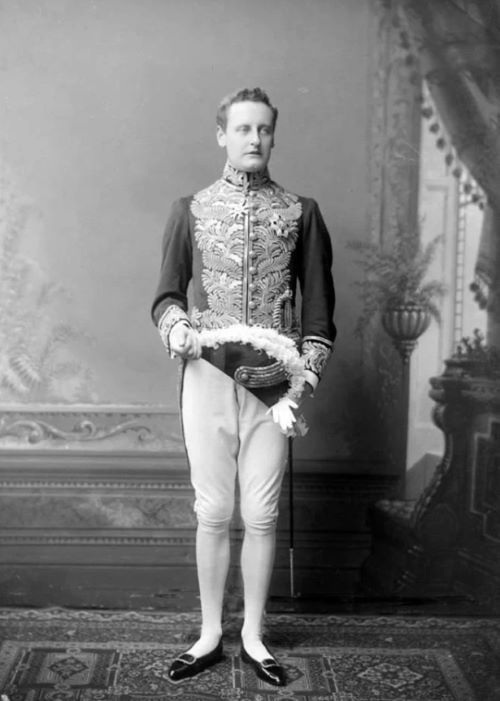
Hugh Grosvenor war ein wütender, unerfüllter Mann - trotz dreier Ehen (und er würde noch ein viertes Mal heiraten).
1931 war Grosvenor unglücklich mit seiner dritten Frau, Loelia Ponsonby, verheiratet. Sie behauptete, er habe sich jede Nacht betrunken und sei untreu gewesen. Doch während er jegliche sexuelle Freiheit genoss, erwartete er von seinen Mitmenschen, insbesondere von seiner Familie, höchste Maßstäbe an Anstand.
Im Jahr 1931 wurde Earl Beauchamp als Homosexueller „geoutet“. Williams Entlarvung hatte lange auf sich warten lassen. Seit Mitte der zwanziger Jahre kursierten Geschichten über homosexuelle Partys, auf denen einheimische Jugendliche und Fischer den Grafen und seine Gäste bedienten.

Doch sein Verhängnis begann in Australien. Im August 1930 war William zu einer Weltreise aufgebrochen. Er wurde in Sydney „überwältigend“ empfangen und blieb zwei Monate, begleitet von einem Diener aus Madresfield und einem jungen liberalen Abgeordneten, Robert Bernays, der als Redenschreiber fungierte.
Der Earl und sein Kammerdiener teilten die Wohnung nicht als Herr und Diener, sondern als Liebespaar, eine häusliche Vereinbarung, die nicht unbemerkt blieb.
Der Duke of Westminster beauftragte Detektive, weitere Beweise gegen seinen Schwager zu sammeln. Er hoffte, die Liberale Partei durch Beauchamp zu ruinieren, sowie auch Beauchamp persönlich aufgrund seiner privaten Abneigung. Homosexualität war damals eine Straftat.
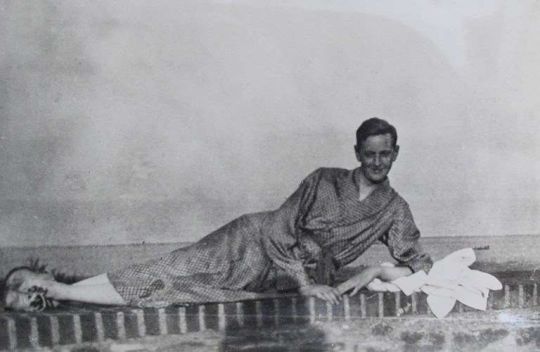
Im Frühjahr 1931 lud der Duke seine Schwester vor und legte ihr im Beisein von drei Anwälten die Beweise vor. Er empfahl Ihr, William sofort mit ihren Kindern im Alter zwischen 14 und fast 28 Jahren zu verlassen und ein Scheidungsverfahren einzuleiten.
Anschließend informierte Westminster den König, dass er Beweise für kriminelle Handlungen der Unanständigkeit zwischen William und einer Reihe von Männern vorlegen könne. William war jedoch ein Freund des Königs.
Seine Majestät hatte keinen Zweifel daran, dass Westminster William entlarven, die Beweise der Presse vorlegen und ihn verhaften lassen würde.
Der Gedanke an einen solchen Prozess, bei dem männliche Prostituierte vorgeladen, Billets-doux verlesen und Schwachstellen bloßgestellt würden, ließen den König eingreifen.
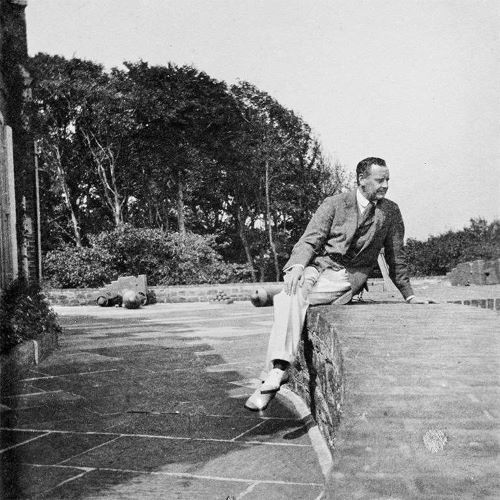
Um die Krise einzudämmen, wurden eigens drei Ritter des Hosenbandordens geschickt, um William davon zu überzeugen, alle seine offiziellen Ämter niederzulegen und England bis Mitternacht zu verlassen.
In einem letzten Tiefschlag schrieb der Duke of Westminster an William einen knappen Brief: „Lieber Schwager, du hast bekommen, was du verdient hast. Deins, Westminster.“
Wenige Tage nach seiner Abreise erfuhren Zeitgenossen, dass der „Exzentriker“ Beauchamp ins Ausland gegangen sei, „um Schlammbäder zu nehmen“, ein Euphemismus für einen homosexuellen Exilanten.
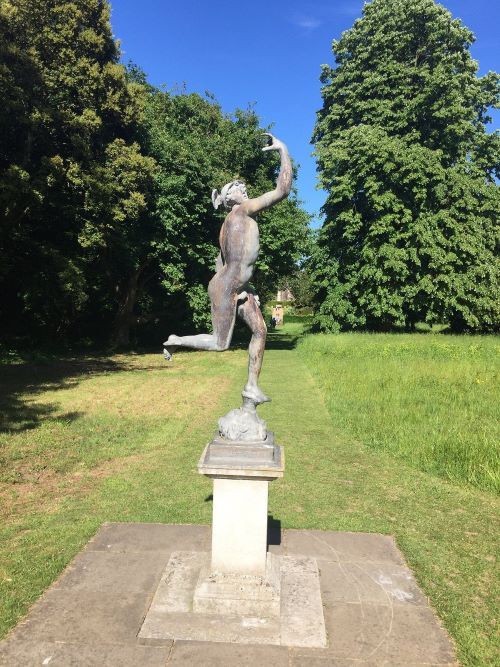
Besonders sehenswert war für uns der 1997 eröffnete „Queen Mother’s Garden“, der für Queen Mum - Elizabeth Bowes-Lyon (1900 – 2002) - zu ihrem 95. Geburtstag geschaffen wurde und wo ihre Lieblingsblumen gepflanzt wurden.

Sie soll sich hier sehr gern aufgehalten haben. An sie erinnert hier auch eine Bronze-Statue: Auf einer Parkbank sitzt einer ihrer Lieblingshunde, ein Welsh Corgi Pembroke.

Die Festung schützt den wunderschönen Garten vor den heftigen Kanalwinden, so wächst und gedeiht hier eine beeindruckende Vielfalt an Pflanzen und Bäumen. Selbst im ausgetrockneten Festungsgraben wachsen Magnolien.

Insgesamt gehören acht Hektar mit Gartenanlagen und Wald zum Castle. Diese Fläche wurde seit dem 16. Jhd. immer wieder umgestaltet, jeweils nach dem Geschmack des ansässigen Lord Wardens.

Heutzutage kümmert sich English Heritage um die Anlage. Selbstverständlich führte der Ein- und Ausgang durch den Empfang mit einem Souvenir Shop. Und ebenso selbstverständlich ist ein Tea Room vorhanden.

Da das Walmer Castle direkt am Strand liegt, kann man von hier aus übrigens fabelhaft am Meer entlang laufen.

Für uns endet hier unsere Reise und es geht wieder per Fähre zurück nach Dünkirchen und weiter nach Deutschland.

Dieses Mal jedoch ohne weitere Zwischenübernachtung, sondern auf direktem Wege.

Ich danke all meinen Lesern, die bis hierhin tapfer durchgehalten haben, für die Aufmerksamkeit.

Wir lesen uns wieder im Dezember, wenn Ihr möchtet, wenn es für uns wieder einmal nach Namibia geht.
Good Night!
Angie, Micha und Mr. Bunnybear (Hasenbär)
10 notes
·
View notes
Text
100 must-read books!
This is a list of books considered "must-reads" from various lists and online posters. I'll be reviewing them as I go but mainly keeping track of what I have and haven't read here.
American Gods by Neil Gaiman
Lord of the Flies by William Golding
Fahrenheit 451 by Ray Bradbury
Sophie's World by Jostein Gaarder
Wide Sargasso Sea by Jean Rhys
The Great Gatsby by F. Scott Fitzgerald
To Kill a Mockingbird by Harper Lee
Matilda by Roald Dahl
The Secret History by Donna Tart
Do Androids Dream of Electric Sheep by Philip K. Dick
The Godfather by Mario Puzo
Murder on the Orient Express by Agatha Christie
The Man Who Mistook His Wife for a Hat by Oliver Sacks
Noughts and Crosses by Malorie Blackman
In Cold Blood by Truman Capote
Frankenstein by Mary Shelly
Alice's Adventures in Wonderland by Lewis Carroll
Heart of Darkness by Joseph Conrad
Wuthering Heights by Emily Bronte
Nineteen Eighty-Four by George Orwell
The Grapes of Wrath by John Steinbeck
Norwegian Wood bt Haruki Murakami
One Flew Over the Cuckoo's Nest by Ken Kesey
The Man in the Iron Mask by Alexandre Dumas
The Color Purple by Alice Walker
The Girl with the Dragon Tattoo by Stieg Larsson
Lolita Vladimir Nabokov
Great Expectations by Charles Dickens
The Harry Potter Series by J.K Rowling
His Dark Materials trilogy by Philip Pullman
The Old Man and the Sea by Ernest Hemingway
The Picture of Dorian Gray by Oscar Wilde
The Road by Cormac McCarthy
Ulysses by James Joyce
Bad Science by Ben Goldacre
I Capture the Castle by Dodie Smith
Fear and Loathing in Las Vegas by Hunter S. Thompson
Les Miserables by Victor Hugo
The Catcher in the Rye by J.D Salinger
The Wind in the Willows by Kenneth Grahame
Wild Swans by Jung Chang
The Hitchhikers Guide to the Galaxy by Douglas Adams
Tinker, Tailor, Soldier, Spy by John le Carre
Crime and Punishment by Fyodor Dostoevsky
The Poisonwood Bible by Barbara Kingsolver
Adventures of Huckleberry Finn by Mark Twain
Gulliver's Travels by Johnathan Swift
The War of the Worlds by H.G Wells
Anna Karenina by Leo Tolstoy
Freakonomics by Steven D. Levitt
Persuasion by Jane Austen
The Help by Kathryn Stockett
Beloved by Toni Morrison
A Clockwork Orange by Anthony Burgess
American Psycho by Bret Easton Ellis
Notes from a Small Island by Bill Bryson
Macbeth by Shakespeare
The Lord of the Rings (trilogy) by J.R.R Tolkien
The Outsiders by S.E Hinton
Mrs. Dalloway by Virginia Woolf
The Handmaid's Tale by Margaret Atwood
A Wild Sheep Chase by Haruki Murakami
Schindler's Ark by Thomas Keneally
London Fields by Martin Amis
Sherlock Holmes and the The Hound of the Baskerville's by Arthur Conan Doyle
My Man Jeeves by P.G Wodehouse
The English Patient by Michael Ondaatje
The Mill on the Floss by George Eliot
The Count of Monte Cristo by Alexander Dumas
Little Women by Louisa May Alcott
Gladys Aylward the Little Woman by Gladys Aylward
Mindnight's Children by Salman Rushdie
Tess of the D'Ubervilles by Thomas Hardy
The Boy in the Stripped Pajamas by John Boyne
Hamlet by William Shakespeare
Goodnight Mister Tom by Michelle Magorian
Dissolution by C.J Sansom
The Time Machine by H.G Wells
Winnie the Pooh (complete collection) by A.A Milne
Animal Farm by George Orwell
The Diary of a Young Girl by Anne Frank
The Castle by Franz Kafka
Dracula by Bram Stoker
All Quiet on the Western Front by Eric Maria Remarque
Bridget Jones's Diary by Helen Fielding
The Kite Runner by Khaled Hosseini
Pride and Prejudice by Jane Austen
To The Lighthouse by Virginia Woolf
Memoirs of a Geisha by Arthur Golden
Misery by Stephen King
The Chronicles of Narnia by C.S Lewis
The Shining by Stephen King
The Odyssey by Homer
War and Peace by Leo Tolstoy
The Secret Garden by Frances Hodgson
Tell No One by Harlan Coben
Moby Dick by Herman Melville
A Tale of Two Cities by Charles Dickens
Middlemarch by George Eliot
Jane Eyre by Charlotte Bronte
10 notes
·
View notes
Link
#AdmiralNelson#Armut#Aufstieg#Briefe#deutsch#England#Flotte#Gesellschaft#Krieg#LadyHamilton#Liebe#Lust#Neapel#Reichtum#Romanze#Schönheit#Verführung#Verrat
2 notes
·
View notes
Note
Does the pied piper had a name?
He does have a name! His name is Jeremy. Jeremy William Kirchhoff.
I named him after his voice actor (Jeremy Stieg) because he needs more credit. I mean, come on. What’s the point of having a voice actor if your character doesn’t even talk? He needs more recognition, not just for playing the role of the Piper, but also because he’s the son of the author of the original Shrek! fairytale!
So sorry for my little ramble there, I’m just kind of upset how voice actors don’t get a lot of attention compared to their characters. I’m rambling again, I’ll stop-
#pied piper#shrek pied piper#shrek 4#shrek forever after#shrek#the pied piper#headcanon#shrek headcanons
8 notes
·
View notes
Text
A recommended reading list of books I own and have read
A Demon in my View by Ruth Rendell
A Judgment in Stone by Ruth Rendell
A Place Called Freedom by Ken Follett
A Season in Purgatory by Dominick Dunne
A Slow Fire Burning by Paula Hawkins
A Spy in the House of Love by Anais Nin
All Around the Town by Mary Higgins Clark
An Anonymous Girl by Greer Hendricks and Sarah Pekkanen
And Then There Were None by Agatha Christie
Angels & Demons by Dan Brown
Anthem by Ayn Rand
Bag of Bones by Stephen King
Bleak House by Charles Dickens
Breaking Blue by Timothy Egan
Bright Young Women by Jessica Knoll
Carrie by Stephen King
Catherine House by Elisabeth Thomas
Cat’s Eye by Margaret Atwood
Coraline by Neil Gaiman
Crank by Ellen Hopkins
Dark Places by Gillian Flynn
Dark Tales by Shirley Jackson
Dead Man Walking by Sister Helen Prejean
Dead Run by Erica Spindler
Dream Girl by Laura Lippman
Elmer Gantry by Sinclair Lewis
Ethan Frome by Edith Wharton
Every Breath You Take by Ann Rule
Every Secret Thing by Laura Lippman
Fahrenheit 451 by Ray Bradbury
Fatal Flowers by Rosemary Daniell
Fight Club by Chuck Palahniuk
Flowers for Algernon by Daniel Keyes
Flowers in the Attic by V.C. Andrews
Garden of Shadows by V.C. Andrews
Girl, Interrupted by Susanna Kaysen
Give Me Your Hand by Megan Abbott
Go Ask Alice by Anonymous
Gone Girl by Gillian Flynn
Good Girls Lie by J.T. Ellison
Green River, Running Red by Ann Rule
Help the Poor Struggler by Martha Grimes
High Lonesome by Joyce Carol Oates
I Am the Only Running Footman by Martha Grimes
I Know You Know by Gilly Macmillan
I Never Promised You a Rose Garden by Joanne Greenberg
If You Really Loved Me by Ann Rule
In a Dark, Dark Wood by Ruth Ware
In Cold Blood by Truman Capote
Interview with the Vampire by Anne Rice
Into the Water by Paula Hawkins
Jane Eyre by Charlotte Bronte
Just Kids by Patti Smith
Lost Souls by Lisa Jackson
Luckiest Girl Alive by Jessica Knoll
Menfreya in the Morning by Victoria Holt
Mexican Gothic by Silvia Moreno-Garcia
Mrs. Dalloway by Virginia Woolf
Murder on the Orient Express by Agatha Christie
My Dark Vanessa by Kate Elizabeth Russell
My Sweet Audrina by by V.C. Andrews
Never Look Back by Alison Gaylin
Night Gaunts by Joyce Carol Oates
Nine Stories by J.D. Salinger
Nowhere Like Home by Sara Shepard
Over Tumbled Graves by Jess Walter
Pearl in the Mist by V.C. Andrews
Petals on the Wind by V.C. Andrews
Pursuit by Joyce Carol Oates
Rebecca by Daphne du Maurier
Ruby by V.C. Andrews
Running with Scissors by Augusten Burroughs
Sharp Objects by Gillian Flynn
She’s Come Undone by Wally Lamb
Slenderman by Kathleen Hale
Small Sacrifices by Ann Rule
Southern Cross by Patricia Cornwell
Steppenwolf by Hermann Hesse
Suicide Blonde by Darcey Steinke
Summer by Edith Wharton
Tess of the d’Urbervilles by Thomas Hardy
The 9th Girl by Tami Hoag
The Accursed by Joyce Carol Oates
The Anodyne Necklace by Martha Grimes
The Bell Jar by Sylvia Plath
The Black Dahlia by James Ellroy
The Blind Assassin by Margaret Atwood
The Blooding by Joseph Wambaugh
The Blue Hour by Paula Hawkins
The Butterfly Girl by Rene Denfeld
The Catcher in the Rye by J.D. Salinger
The Cutler series by V.C. Andrews
The Da Vinci Code by Dan Brown
The Death of Mrs. Westaway by Ruth Ware
The Deer Leap by Martha Grimes
The Doll Master by Joyce Carol Oates
The Elizas by Sara Shepard
The Exorcist by William Peter Blatty
The Family Upstairs by Lisa Jewell
The Female of the Species by Joyce Carol Oates
The Gemma Doyle trilogy by Libba Bray
The Girl Before by J.P. Delaney
The Girl on the Train by Paula Hawkins
The Girl who Played with Fire by Stieg Larsson
The Girl with the Dragon Tattoo by Stieg Larsson
The Glass Castle by Jeannette Walls
The Great Gatsby by F. Scott Fitzgerald
The Handmaid’s Tale by Margaret Atwood
The Haunting of Hill House by Shirley Jackson
The Heart is a Lonely Hunter by Carson McCullers
The Hudson series by V.C. Andrews
The Hunger Games series by Suzanne Collins
The It Girl by Ruth Ware
The Logan series by V.C. Andrews
The Lovely Bones by Alice Sebold
The Lying Game by Sara Shepard
The Old Contemptibles By Martha Grimes
The Outsiders by S.E. Hinton
The Picture of Dorian Gray by Oscar Wilde
The Prince of Lost Places by Kathy Hepinstall
The Rainbow by D.H. Lawrence
The Right Hand of Evil by John Saul
The Scarlet Pimpernel by Baroness Orczy
The Secret Garden by Frances Hodgson Burnett
The Secret Life of Bees by Sue Monk Kidd
The Shining by Stephen King
The Silver Star by Jeannette Walls
The Stand by Stephen King
The Strange Beautiful by Carla Crujido
The Sundial by Shirley Jackson
The Testaments by Margaret Atwood
The Third Twin by Ken Follett
The Torn Skirt by Rebecca Godfrey
The Turn of the Key by Ruth Ware
The Turn of the Screw & Daisy Miller by Henry James
The Virgin Suicides by Jeffrey Eugenides
The Woman in Cabin 10 by Ruth Ware
The Woman in the Window by A.J. Finn
Thirteen Reasons Why by Jay Asher
To the Lighthouse by Virginia Woolf
Tropic of Cancer by Henry Miller
Under the Bridge by Rebecca Godfrey
Vanish by Tess Gerritsen
Villette by Charlotte Bronte
Wait for Me by Sara Shepard
Walk Two Moons by Sharon Creech
Watching You by Lisa Jewell
We Have Always Lived in the Castle by Shirley Jackson
What Remains of Me by Alison Gaylin
Where the Crawdads Sing by Delia Owens
White Oleander by Janet Fitch
Wonderland by Joyce Carol Oates
Wuthering Heights by Emily Bronte
You Are Not Alone by Greer Hendricks and Sarah Pekkanen
1 note
·
View note
Text

So, this movie had a rather interesting impact across the studio, animation and the internet. After his falling out with Disney, Katzenburg further wanted to get back at them with this as his secret weapon. This was based on a book of the same name, written by William Stieg, where his art style was replicated in the book opening. Decades later, the movie maintains a monstrous presence across the internet, spawning video after video about its content, where there’s even a reanimated collaboration done by several artists. While establishing itself as one of the most memorable films of its time and following, its content also made its mark on many animated movies that came afterwards.
In fact, the impact of this very movie is tremendous as DreamWorks changed their opening logo to its introduction.
Shrek, a feared ogre, isolates himself in the swamp until he’s approached by an escaped donkey and then a whole group of fairy tale creatures that were banished to his land. It turns out that Lord Farquard of Duloc banished them due to his high prejudice, causing Shrek to leave his swamp and demand him to reverse the change. In a pursuit to officially become king, Farquard sends Shrek on a quest to rescue the imprisoned Princess Fiona so he can marry her, but the ogre soon finds himself letting his guard down and developing some strong feelings.
To start things off, the plot is mainly the hero going there and back, Point A to B, but it fills itself with a key point that many amounts of media attempt to do by subverting its fairytale premise. It presented some great subversion of the cliches where the monstrous main character isn’t the bad guy and becomes the hero by the end, the princess isn’t a damsel, the dragon turns out to be a longing romantic and the how a unique couple get together by the end. It does follow Beauty and the Beast at first, but doesn’t base its whole storytelling based on the premise, rather than giving us an entirely new ending.
The film achieved a new style that’s meant to start as a jab at Walt Disney Animation Studio’s whimsical way of starting their movies with a book and narration; instead, Shrek begins the whole story, only to use the very pages as his own toilet paper. From the moment his outhouse flushes and he grandly steps out, that’s when the audience knew exactly what movie they were receiving. There’s not even a sign of an original song number from Shrek, but a track to fully represent what they’re heading for.
People liked to call this the “movie that started it all”; it contained tropes where nearly every animated movie tried to copy them, even to this day. You name it, something tried to copy its fairytale premise like Hoodwinked, Chicken Little and Happily N’ever After, while a plethora of the content such as immature fart jokes, celebrity voice-casting, the law of a dance party ending and many more were repeated rather poorly.
Shrek was the beginning of that but I can’t really fault it. I feel Shrek does all those tropes perfectly, as they fit the mood of the movie.
It was doing itself well, up until the misunderstanding where Shrek does overhears some horrible descriptions, where the mistake rubs off on Fiona. While it does cloud the third act, even having a whole song number, I felt that they executed the misunderstanding cliche rather well, as it’s meant to reflect on Shrek’s insecurities where he doesn’t want to be viewed as a monster. When he snaps at Donkey, he does sound legitimately heartbroken, where it’s up to the sidekick to call him out on his behaviour and make things right between the two of them.
There’s some movie references such as Shrek quoting Babe’s closing line and a Matrix fight scene, but they aren’t forced. I can actually see Shrek praising Donkey in that same fashion.
With every good joke, there’s rarely a bad one but some are poked at expense with the villain’s small height. I don’t have a problem as it’s the main characters making fun of the racist and egotistical villain, but they elaborated on the whole point and it got tiresome.
Why not talk about the characters? Shrek as the onion-obsessed ogre as he is comes off as a likeable and sympathetic creature, where he relishes in the hatred that people gave him due to their first impression. Shrek starts off as disgusting and mean-spirited to newcomers but as the movie progresses, he begins to soften up and actually express his true feelings; you see why he hates society and how people choose to fear him from his appearance alone, so his one wish is to permanently isolate himself from the entire civilisation. It’s how he’s viewed that takes a serious toll on his insecurities. It’s up to this adventure which changes his life for the better, meeting new companions that remain an impact.
In fact, Shrek’s character arc I feel is the strongest as you do see it in the entire franchise, minus the third movie, where he doesn’t feel accepted and how he doesn’t fit in. His progression is as strong as few main characters from the DreamWorks franchise such as Hiccup and Po.
Donkey is also a likeable character, where he’s the stand-in for the annoying sidekick trope at first, pretty much spewing mouth diarrhoea for most of the first act. However, that’s pretty much the point as Donkey basically wants to see a friend in Shrek, first seeing him as someone to look up to. When asked if Shrek’s species deters him the slightest, Donkey shows no sign of care, surprising the lonesome ogre. Donkey is essentially a little lost child who glues himself to the begrudging type, where no matter how many times he’s told to leave, he never does so. He does become an amazing friend at the end, helping both Shrek and the princess with their problems. Eventually, he would clash against the dragon, before revealing a rather feminine side from the beast, where the two form a hilarious connection.
Fiona is a really good character as well, shown as the princess who sticks to the common trope of how to be rescued but eventually learns to let loose. At first, Shrek sees her as just a way to get his home back, but then the two begin to respect each-other along the way; Fiona sees how Shrek has a heart, while he sees the boisterous and disgusting side to her, impressing him greatly. You also see a secret involving Fiona which changes the entire perspective and also becomes relevant for their connection at the end.
As for their connection, they do really work from one cliche involving the couple that argue at first before becoming one. While the two butted heads at first, with Shrek seeing Fiona as his main quest and the other repulsed by his appearance. Eventually, Fiona sees the sympathetic side to Shrek and treats him nicer, before showing a fighting side that astounds the ogre. While the misunderstanding trope was used, it adds more to their struggles in life as both are seen as monsters that don’t belong in a romantic fairy tale, which made them closer than before by the end.
I loved their fate by the end on how it twists the tale around by maintaining the princess as an ogre, who’s seen “beautiful” towards him. It’s a heartwarming spin on the broken curse trope.
Lord Farquard is a pretty good villain, standing as a brutal dictator who banishes the fairy tale creatures as they strike a horrible sign in his kingdom. He enjoys nothing more than seeing their suffering, going to the point of outright torturing the Gingerbread Man for answers and even murdering one of them for a decoration off-screen. He’s a loathsome creature, standing off as more of a monster than the titular character, seeing the fairy tale characters as lower-class citizens. He bares a horrible and distasteful face of pride, acknowledging that the knights’ deaths at the tournament are for solely his own sacrifice. His main goal is to become an official ruler by marrying a princess, where he himself doesn’t see her as a person but a trophy, even lusting over her image while in bed.
What adds to the surrounding joke was his height, which loses some points in the comedy for overusing itself. I’ve heard a common criticism from fans on how this contradicts the message of beauty within, where the mains would take pot shots at his height. I suppose that this was geared to the mains making fun of the villainous leader due to his prejudice remarks, where they share humour on his lack of intimidation.
Many fairy tale creatures make their mark in the movie but don’t clog up the running time with their appearances, where they’re shown as background characters that assist the mains: there’s the Magic Mirror that speaks like a game show host; Robin Hood, presented as the French-accented Monsieur Hood, who claims Fiona as his damsel and attacks Shrek with his Merry Men, only to suffer from the hands of Fiona; the banished group consisting of many familiar faces such as the disowned Pinocchio and three German pigs inform Shrek of their situation; there’s also the Dragon that guards Fiona’s tower, but is portrayed as someone who’s easily swooned by the flattering Donkey, surprising on how overly-affectionate she really can be. I liked on how they built up the scenario of the latter character where the writers don’t rub it off as a one-off joke, but involve her by the movie’s climax.
Nowadays, a lot of family features gather a ton of celebrities for the sake of marketing; this movie managed to have these actors perfectly fit their characters.
Originally, Shrek was going to be voiced by Chris Farley, but then the actor passed away, where there’s even footage of the archives. So instead, they hired Mike Myers as Shrek, where he gave the ogre a Scottish accent as opposed to a Canadian one, as he felt that it fitted the character’s background. Cameron Diaz aced the headstrong and spunky attitude of Fiona, allowing this character to have a variety of personalities from the gentle yet firm type and also one that glamoured in disgusting tropes. You can also tell that Eddie Murphy threw everything he had from his style of comedy into the character of Donkey, balancing in between of an annoyingly-talkative best friend and an innocent outcast. I’m also surprised that no-one else even mentions John Lithgow’s performance as Lord Farquard at all, where he delivered a great amount of booming nature from a short character while allowing some small comedic moments.
In fact, it’s the way how these actors delivered some basic lines such as “Why are you following me?”, “Two things, okay? Shut. Up.”, “I like that boulder. That is a nice boulder.”, “… and so on and so forth.” and many more.
This is the last time I’ll mention how this movie’s iconic style changed the industry, as this contained quite a few pop songs. To put it bluntly, the movie shuns the idea of original songs, especially when Disney was achieving awards, and makes fun of that such as Shrek’s annoyance towards singing and Fiona’s high vocalisation causing a mother bird to explode. From the iconic beginning alone, we start with Smash Mouth’s All Star, presenting the wild home life of the main character and slapping the faces of newcomers that the overall feature isn’t even related to a musical. Whenever the very song is played, people will immediately name that Shrek’s anthem, as no matter how you look at it, the movie is always associated with the very song.
This would be another team that various family movies attempted to copy by throwing in any dated pop song to relate to the younger audience. However, this film is the pinnacle of how to do it right as the songs perfectly fitted the scenario relating to the characters: Bad Reputation covers the fight scene between the two rejects against the king’s army; we also receive a travelling song, I’m On My Way; My Beloved Monster is a no-brainer for the budding romance between Shrek and Fiona; I already went on about the unavoidable misunderstanding trope, where Hallelujah clouds the delivered depression; thanks to Lithgrow’s involvement, we end with another song by Smash Mouth, I’m a Believer, allowing Murphy’s performance, capping off the entire feature with a bang.
I’m honestly impressed that this movie still holds up in terms of its comedy, story and tropes done stupendously well. I can see where current audiences are coming from with the argument that this movie is overrated and played thanks to internet culture, but I never see this as the fault of the product. I still think it’s a fantastic movie where it holds up as a staple in animation history.
Final Rating: B+
9/10
1 note
·
View note
Text
book log - 2017
tampa by alissa nutting
turtles all the way down by john green
vegas girls by heather skyler
class mom by laurie gelman
anne of green gables by l.m. montgomery
the identicals by elin hilderbrand
quidditch through the ages by j.k. rowling
the breakdown by b.a. paris
final girls by riley sager
audition by ryu murakami
gray wolf island by tracey neithercott
the stranger beside me by ann rule
one of us is lying by karen m. mcmanus
the call by peadar o gullin
a thousand nights by e.k. johnston
the library at mount char by scott hawkins
tender morsels by margo lanagan
rings by koji suzuki
the good daughter by karin slaughter
because you love to hate me by amerie
the party by robyn harding
primates of park avenue by wednesday martin
you by caroline kepnes
someday, someday, maybe by lauren graham
the hating game by sally thorne
eleanor oliphant is completely fine by gail honeyman
shine by lauren myracle
when dimple met rishi by sandhya menon
you can have a dog when i'm dead by paul benedetti
it's always the husband by michele campbell
princeless: raven the pirate princess by jeremy whitley
princeless: free women by jeremy whitley
goodbye, vitamin by rachel khong
sabine's notebook by nick bantock
always and forever, lara jean by jenny han
talking as fast as i can by lauren graham
three wishes by liane moriarty
behind closed doors by b.a. paris
dark places by gillian flynn
behind her eyes by sarah pinborough
baby proof by emily giffin
american gods by neil gaiman
confessions of a domestic failure by bunmi laditan
wedding night by sophie kinsella
you suck by christopher moore
night film by marisha pessi
the subtle art of not giving a fuck by mark manson
let's explore diabetes with owels by david sedaris
the here and now by ann brashares
it started with goodbye by christina june
murder games by elisabeth crabtree
the enchantress returns by chris colfer
down the rabbit hole by holly madison
women who run with the wolves by clarissa pinkola estes
goons n' roses by donna joy usher
the silent wife by a.s.a. harrison
cocoa and chanel by donna joy usher
secondhand souls by christopher moore
the seven steps to closure by donna joy usher
stranger than fanfiction by chris colfer
you are here by jenny lawson
killing mr. griffin by lois duncan
a dirty job by christopher moore
joyland by stephen king
irrestible by adam alter
small great things by jodi picoult
stranger with my face by lois duncan
the vegas diaries by holly madison
the potluck club by linda evans shepard
the girl with the dragon tattoo by stieg larsson
the wishing spell by chris colfer
one less problem without you by beth harbison
saving ceecee honeycutt by beth hoffman
in the country we love by diane guerrero
the last anniversary by liane moriarty
i woke up dead at the mall by judy sheehan
remembrance by meg cabot
girl in translation by jean kwok
very good lives by j.k. rowling
milk and honey by rupi kaur
my grandmother asked me to tell you she's sorry by fredrik backman
the screwtape letters by c.s. lewis
reconstructing amelia by kimberly mccreight
how to fall in love by cecelia ahern
wild by cheryl strayed
NOS4A2 by joe hill
year of yes by shonda rhimes
troublemaker by leah remini
the summer we read gatsby by daniella ganek
the miraculous journey of edward tulane by kate dicamillo
sorry not sorry by naya rivera
the circle by dave eggers
the woman in cabin 10 by ruth ware
boneshaker by cherie priest
time cat by lloyd alexander
the color purple by alice walker
all the light we cannot see by anthony doerr
the princess bride by william goldman
when breath becomes air by paul kalanthi
the wangs vs. the world by jade chang
mischiling by affinity konar
sarong party girls by cheryl lu-lien tan
nine woman, one dress by jane l. rosen
the light between oceans by m.i. stedmaan
magonia by maria dahvana headley
the restaurant critic's wife by elizabeth laban
the couple next door by shari lapena
the wedding sisters by jamie brenner
how to be a bawse by lilly singh
where am i now? by mara wilson
scrappy little nobody by anna kendrick
double cup love by eddie huang
little girl gone by gerry schmitt
truly madly guilty by liane moriarty
something in between by melissa de la cruz
rich people problems by kevin kwan
modern romance by aziz ansari
yes, my accent is real by kunal nayyar
the girl on the train by paula hawkins
we should hang out sometime by josh sundquist
love ltters to teh dead by ava dellaira
what alice forgot by liane morairty
bringing it home by tilda shalof
the maintenance man by michael baisden
charlie and the great glass elevator by roald dahl
the princess diaries by meg cabot
0 notes
Text
Stole this from someone else on a tag.
A book recommended by a librarian Saint X by Alexis Schiatkin
A book that’s been on your TBR list for way too long Wicked by Gregory Maguire
A book of letters Mr. Men series by Roger Hargreaves
An audiobook The Otto Digmore Difference by Brent Hartinger
A book by a person of color Their Eyes Were Watching God by Toni Morrison
A book with one of the four seasons in the title Suddenly Last Summer and Other Plays by Tennessee Williams
A book that is a story within a story Water For Elephants by Sara Gruen
A book with multiple authors The Heist by Janet Evanovich and Lee Goldberg
An espionage thriller The Davinci Code by Dan Brown
A book with a cat on the cover Pet Sematary by Stephen King
A book by an author who uses a pseudonym The Regulators by Richard Bachman
A bestseller from a genre you don’t normally read Hidden Figures: The American Dream and the Untold Story of the Black Women Mathematicians Who Helped Win the Space Race by Margot Lee Shatterly
A book by or about a person who has a disability Deaf Utopia by Nyle DiMarco and Robert Siebert
A book involving travel Harry Potter and the Deathly Hallows by JK Rowling
A book with a subtitle Monster: The True Story of the Jeffrey Dahmer Murders by Anne E Schwartz
A book that’s published in 2017 Turtles All the Way Down by John Green
A book involving a mythical creature It by Stephen King
A book you’ve read before that never fails to make you smile Red, White and Royal Blue by Casey McQuiston
A book about food The Hundred Foot Journey by Richard C Morais
A book with career advice One For the Money by Janet Evanovich
A book from a nonhuman perspective The One and Only Ivan by Katherine Applegate
A steampunk novel Twenty Thousand Leagues Under the Sea by Jules Verne
A book with a red spine Harry Potter and the Chamber of Secrets by Harry Potter
A book set in the wilderness Call of the Wild by Jack London
A book you loved as a child The Monster at the End of This Book by Jon Stone
A book by an author from a country you’ve never visited Heartstopper by Alice Oseman
A book with a title that’s a character’s name Coraline by Neil Gaiman
A novel set during wartime The Book Thief by Markus Zusak
A book with an unreliable narrator How's Moving Castle by Dianna Wynne Jones
A book with pictures Amelia Bedelia Means Business by Herman Parish
A book where the main character is a different ethnicity than you Red, White and Royal Blue by Casey McQuiston
A book about an interesting woman The Diary of a Young Girl by Anne Frank
A book set in two different time periods A Connecticut Yankee in King Arthur's Court by Mark Twain
A book with a month or day of the week in the title Mad Hatters and March Hares by Ellen Datlow
A book set in a hotel The Shining by Stephen King
A book written by someone you admire This Time Together by Carol Burnett
A book that’s becoming a movie in 2017 Berlin Syndrome by Melanie Joosten
A book set around a holiday other than Christmas Cupid Strikes…Three Times by Ajme Williams
The first book in a series you haven’t read before A Court of Thorns and Roses by Sara J Maas
A book you bought on a trip The Girl with the Dragon Tattoo by Stieg Larsson
ADVANCED: A book recommended by an author you love One For the Money by Janet Evanovich
A bestseller from 2016 Harry Potter and the Cursed Child by JK Rowling, John Tiffany, and Jack Thorne
A book with a family-member term in the title A Child Called It by Dave Pelzer
A book that takes place over a character’s life span A Prayer For Owen Meaney by John Irving
A book about an immigrant or refugee We Were Dreamers by Simu Liu
A book from a genre/subgenre that you’ve never heard of Dungeons & Drag Queens by Emma Alice Johnson (bizarro fiction)
A book with an eccentric character A Series of Unfortunate Events by Daniel Handler
A book that’s more than 800 pages The Hunchback of Notre Dame by Victor Hugo
A book you got from a used book sale Wicked by Gregory Maguire
A book that’s been mentioned in another book The Outsiders by SE Hinton
A book about a difficult topic Turtles All the Way Down by John Green (OCD)
A book based on mythology The Song of Achilles by Madeline Miller
0 notes
Text
Opinion: Millennials are Different Because We Grew Up with Shrek
Opinion: Millennials are Different Because We Grew Up with Shrek

All of my life I have read articles and been told by grown ups that all generations are radically different from each other. And for the most part, I have disagreed. In my experience, people will be who they are going to be and while the trends may be different, the people stay the same. That is, until recently when I realized that no, there is something different about us, the millennials. All…
View On WordPress
#because#different#grew#mike myers#millennial#millennials#nathan ellwood#opinion#shrek#up#william stieg
1 note
·
View note
Text
100 livres à avoir lu dans sa vie (entre autres):
1984, George Orwell ✅
A la croisée des mondes, Philip Pullman
Agnès Grey, Agnès Bronte ✅
Alice au Pays des merveilles, Lewis Carroll ✅
Angélique marquise des anges, Anne Golon
Anna Karenine, Léon Tolstoï
A Rebours, Joris-Karl Huysmans
Au bonheur des dames, Émile Zola
Avec vue sur l'Arno, E.M Forster
Autant en emporte le vent, Margaret Mitchell
Barry Lyndon, William Makepeace Thackeray
Belle du Seigneur, Albert Cohen
Blonde, Joyce Carol Oates
Bonjour tristesse, Françoise Sagan ✅
Cent ans de solitude, Gabriel Garcia Marquez
Charlie et la chocolaterie, Roald Dahl ✅
Chéri, Colette
Crime et Châtiment, Féodor Dostoïevski
De grandes espérances, Charles Dickens
Des fleurs pour Algernon, Daniel Keyes
Des souris et des hommes, John Steinbeck ✅
Dix petits nègres, Agatha Christie ✅
Docteur Jekyll et Mister Hyde, Robert Louis Stevenson ✅
Don Quichotte, Miguel Cervantés
Dracula, Bram Stocker ✅
Du côté de chez Swann, Marcel Proust
Dune, Frank Herbert ✅
Fahrenheit 451, Ray Bradbury ✅
Fondation, Isaac Asimov
Frankenstein, Mary Shelley ✅
Gatsby le magnifique, Francis Scott Fitzgerald ✅
Harry Potter à l'école des sorciers, J.K Rowling
Home, Toni Morrison
Jane Eyre, Charlotte Bronte
Kafka sur le rivage, Haruki Murakami
L'adieu aux armes, Ernest Hemingway ✅
L'affaire Jane Eyre, Jasper Fforde
L'appel de la forêt, Jack London ✅
L'attrape-cœur, J. D. Salinger ✅
L'écume des jours, Boris Vian
L'étranger, Albert Camus ✅
L'insoutenable légèreté de l'être, Milan Kundera
La condition humaine, André Malraux
La dame aux camélias, Alexandre Dumas Fils
La dame en blanc, Wilkie Collins
La gloire de mon père, Marcel Pagnol
La ligne verte, Stephen King ✅
La nuit des temps, René Barjavel
La Princesse de Clèves, Mme de La Fayette ✅
La Route, Cormac McCarthy ✅
Le chien des Baskerville, Arthur Conan Doyle
Le cœur cousu, Carole Martinez
Le comte de Monte-Cristo, Alexandre Dumas : tome 1 et 2
Le dernier jour d'un condamné, Victor Hugo ✅
Le fantôme de l'opéra, Gaston Leroux
Le lièvre de Vaatanen, Arto Paasilinna
Le maître et Marguerite, Mikhaïl Boulgakov
Le meilleur des mondes, Aldous Huxley
Le nom de la rose, Umberto Eco
Le parfum, Patrick Süskind
Le portrait de Dorian Gray, Oscar Wilde ✅
Le Petit Prince, Antoine de Saint-Exupery ✅
Le père Goriot, Honoré de Balzac ✅
Le prophète, Khalil Gibran ✅
Le rapport de Brodeck, Philippe Claudel
Le rouge et le noir, Stendhal ✅
Le Seigneur des anneaux, J.R Tolkien ✅
Le temps de l'innocence, Edith Wharton
Le vieux qui lisait des romans d'amour, Luis Sepulveda ✅
Les Chroniques de Narnia, CS Lewis
Les Hauts de Hurle-Vent, Emily Brontë
Les liaisons dangereuses, Choderlos de Laclos ✅
Les Malaussène, Daniel Pennac ✅
Les mémoires d'une jeune fille rangée, Simone de
Beauvoir
Les mystères d'Udolfo, Ann Radcliff
Les piliers de la Terre, Ken Follett : tome 1
Les quatre filles du Docteur March, Louisa May
Alcott
Les racines du ciel, Romain Gary
Lettre d'une inconnue, Stefan Zweig ✅
Madame Bovary, Gustave Flaubert ✅
Millenium, Larson Stieg ✅
Miss Charity, Marie-Aude Murail
Mrs Dalloway, Virginia Woolf
Ne tirez pas sur l'oiseau moqueur, Harper Lee ✅
Nord et Sud, Elisabeth Gaskell
Orgueil et Préjugés, Jane Austen
Pastorale américaine, Philip Roth
Peter Pan, James Matthew Barrie
Pilgrim, Timothy Findley
Rebecca, Daphne Du Maurier
Robinson Crusoé, Daniel Defoe ✅
Rouge Brésil, Jean Christophe Ruffin
Sa majesté des mouches, William Goldwin ✅
Tess d'Uberville, Thomas Hardy
Tous les matins du monde, Pascal Quignard
Un roi sans divertissement, Jean Giono
Une prière pour Owen, John Irving
Une Vie, Guy de Maupassant
Vent d'est, vent d'ouest, Pearl Buck
Voyage au bout de la nuit, Louis-Ferdinand Céline ✅
Total : 37/100
27 notes
·
View notes
Note
I know that I'm not helping this situation at all but I saw Sheket and read it as shreck and sat there for at least 2 minutes being blown away because I thought Shrek was a word in Hebrew.
My friend my pal I am about to make your fuckin day
4 notes
·
View notes
Link
#AdmiralNelson#Armut#Aufstieg#Briefe#deutsch#England#Flotte#Gesellschaft#Krieg#LadyHamilton#Liebe#Lust#Neapel#Reichtum#Romanze#Schönheit#Verführung#Verrat
2 notes
·
View notes
Text
24 SEVEN RENO NV RESULTS 2022/23
SIDEKICK SOLOS:
1st Jeffrey Funez - VERTICAL
2nd Carly Enos - HYPE
3rd Payton Alizaga - VERTICAL
4th Ma’Laishia Williams - LEGACY
4th Julissa Villalva - LEGACY
4th Karrington Price - CREATIVE EDGE
5th Emersyn Clark - KAOS
6th Lilianna Zernik - NATOMAS
7th Zaya Zorn - LEGACY
SIDEKICK DUO/TRIOS:
1st Hit The Road Jack - VERTICAL
2nd Woody’s Round Up - NATOMAS
3rd California Girls - HYPE
MINI SOLOS:
1st Ruby Taylor - CSPAS STC!
2nd Brooklyn Ward - CSPAS STC!
3rd Leilani Lawlor - K2 STUDIOS STC!
4th Wren Lavery - NORTH STATE BALLET STC!
5th Lisbon Hedrick - NATOMAS STC!
5th Emily Baik - BAY AREA DANCE STC!
6th Naomi Harper - CSPAS
7th McKinley Townsend - CORE CONNECTION
7th Journey Villalva - LEGACY
7th Kasen Hackman - WESTERN NV
8th Mila Dhuy - CREATIVE EDGE
8th Penelope Pranger - CSPAS
9th Lily Dunn - NATOMAS
9th Lulu Collaku - ARTISTIC DANCE PROJECT
9th Madisson Stieg - CORE CONNECTION
9th Taylor Smith - KAOS
10th Rozi LaGrone - HYPE
10th Avery Allison - HYPE
10th Arielle Konaris - YOKO��S
10th Caitlyn Paik - TO THE POINTE
10th Valentina Secrets - CORE CONNECTION
JUNIOR SOLOS:
1st Aria Du - YOKO’S STC!
2nd Fiona Wu - YOKO’S STC!
2nd Esme Chou - P21 STC!
3rd Isabella Tjoe - YOKO’S STC!
4th Harper Ducale - HYPE STC!
5th Avery Yamaguchi - YOKO’S STC!
6th Joy Lin - YOKO’S STC!
6th Claire Pistor - ARTISTIC DANCE PROJECT STC!
7th Emma Burke - CORE CONNECTION STC!
7th Jenasys Villalva - LEGACY STC!
7th Olive O’Connell - OCPAA STC!
8th June Newmarker - CREATIVE EDGE
8th Alina Tolbert - ECHO
8th Maja Gisslen - ECHO
9th Nicole Yordanova - LOS ALTOS
9th Novella Segrest - CORE CONNECTION
10th Brehnyx Ames - HEART AND SOLE
10th Harper Jones - ECHO
10th Brooke Patterson - ARTISTIC DANCE PROJECT
10th Piper Perusse - THE COMPANY SPACE
10th Eunyu Lee - CREATIVE EDGE
10th Lily Cellura - CREATIVE EDGE
10th Sophia Sufuentes - HYPE
10th Aubrey Thomas - DANCERS TURNOUT
JUNIOR DUO/TRIOS:
1st Buckle Up - HYPE STC!
2nd Pink Panther - CORE CONNECTION
3rd What Is Jazz - WESTERN NV
8 notes
·
View notes
Text
Gosho's Detective Picture Book Reviews
My review of detectives (and detective novels) based on Gosho's Detective Picture Book (also called Gosho's Mystery Library) are as below, to be completed not in the near future.
❤️ denote my personal favorites
Sherlock Holmes (Arthur Conan Doyle) ❤️
Kogoro Akechi (Edogawa Rampo)
Hercule Poirot (Agatha Christie) ❤️
Arsene Lupin (Maurice Leblanc)
Jules Maigret (Georges Simenon)
Kousuke Kindaichi (Seishi Yokomizo)
Lieutenant Columbo (Richard Levison and William Link)
Zenigata Heiji (Kodo Nomura)
Philip Marlowe (Raymond Chandler)
C. Auguste Dupin (Edgar Allan Poe)
Ellery Queen (Ellery Queen) ❤️
V.I. Warshawski (Sara Paretsky)
Father Brown (C.K. Chesterton)
Cordelia Gray (P.D. James) ❤️
Heizo Hasegawa (Shotaro Ikenami)
Mitsuhiko Asami (Yasuo Uchida)
Nero Wolfe (Rex Stout)
Shunsaku Kudo (Nobumitsu Kodaka)
Hannibal Lecter (Thomas Harris)
Miss Marple (Agatha Christie) ❤️
Sam Spade (Dashiell Hammett)
Shozo Totsugawa (Kyotaro Nishimura)
Ninzaburo Furuhata (Kouki Mitani)
Perry Mason (Erle Stanley Gardner)
Mikeneko Holmes (Jiro Akagawa)
Inspector Samejima (Arimasa Osawa)
James Bond (Ian Fleming)
Kyosuke Kamizu (Akimitsu Takagi)
Charlie Chan (Earl Derr Biggers)
John Thorndyke (Richard Austin Freeman)
Touyama Kin-san (Tatsurou Jinde)
Mike Hammer (Mickey Spillane)
Philo Vance (S.S. Van Dine)
Akakabu-kenji (Shunzo Waku)
Drury Lane (Ellery Queen)
Katherine Turner (Misa Yamamura)
Henry Jackson (Isaac Asimov)
Denshichi (Tatsurou Jinde)
Lew Archer (Ross Macdonald)
Kiyoshi Mitarai (Soji Shimada)
The Old Man in the Corner (Baroness Orczy)
Joseph Rouletabille (Gaston Leroux)
Hanshichi (Kido Okamoto) ❤️
Koichiro Munakata (Seiichi Morimura)
Eitaro Imanishi (Seicho Matsumoto)
Gideon Fell (John Dickson Carr)
Yuichiro Goda (Kaoru Takamura)
Ukyou Sugishita (Yasuhiro Koshimizu)
Steve Carella (Ed McBain)
Hideo Himura (Alice Arisugawa)
Riyako Asabuki (Shizuko Natsuki)
Robert Ironside (Collier Young)
Akihiko Chuzenji (Natsuhiko Kyogoku)
Kiyoshi Shimada (Yukito Ayatsuji)
The Continental Op (Dashiell Hammett) ❤️
Ningyo Sashichi (Seishi Yokomizo)
Joseph French (Freeman Wills Crofts)
Yoshibumi Takagi (Kenzo Kitakata)
Mom (James Yaffe)
Rintaro Norizuki (Rintaro Noziruki)
Koko (Lilian Jackson Braun)
Manabu Yukawa (Keigo Higashino) ❤️
Daisuke Kanbe (Yasutaka Tsutsui)
Inspector Zenigata (Monkey Punch)
Robert Langdon (Dan Brown)
Akojuro Senba (Juran Hisao)
Kanki Ibaragi (Futaro Yamada)
Bannai Tarao (Yoshitake Hisa)
Richard Cuff (Wilkie Collins)
Philip Trent (E.C. Bentley)
Gregory House (David Shore)
Yoshio Kuraishi (Hideo Yokoyama)
Adrian Monk (Andy Breckman and David Hoberman)
Inspector Onitsura (Tetsuya Ayukawa)
Enshi Shunotei (Kaoru Kitamura)
Lincoln Rhyme (Jeffery Deaver)
Kei Enomoto (Yusuke Kishi)
Keisuke Shiratori (Takeru Kaido)
Genya Tojo (Shinzo Mitsuda)
Shioriko Shinokawa (En Mikami)
Handyman of Susukino (Naomi Azuma)
Kageyama (Tokuya Higashigawa)
Hotaro Oreki (Honobu Yonezawa)
Lisbeth Salander (Stieg Larsson)
Lieutenant Fukuie (Takahiro Ookura)
Takeshi Yoshiki (Soji Shimada)
Jiro Egami (Alice Arisugawa)
Kyouko Okitegami (Nisio Isin)
Sakurako Kujou (Shiori Ota)
The Phantom Thief Detective Yamaneko (Manabu Kaminaga)
Riko Rinda (Keisuke Matsuoka)
Shinichiro Hanaoka (Koji Hayashi and Junpei Yamaoka)
Richard Castle (Andrew W. Warlowe)
Hiroto Miyama (Manabu Uda)
Yukimasa Yugami (Hideo Iura)
Mikoto Mitsumi (Akiko Nogi)
Keita Kurokochi (Takashi Nagasaki)
Totono Kuno (Yumi Tamura)
Maomao (Natsu Hyuga)
Sherlock Holmes (Steven Moffat and Mark Gatiss) ❤️
Rohan Kishibe (Hirohiko Araki)
Seiko Fuji (Miko Yasu)
11 notes
·
View notes